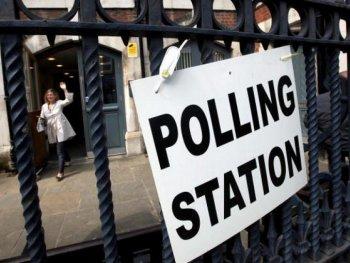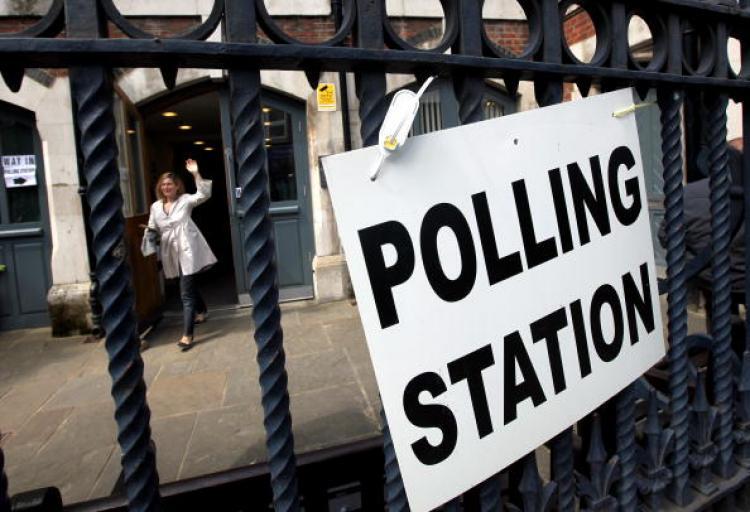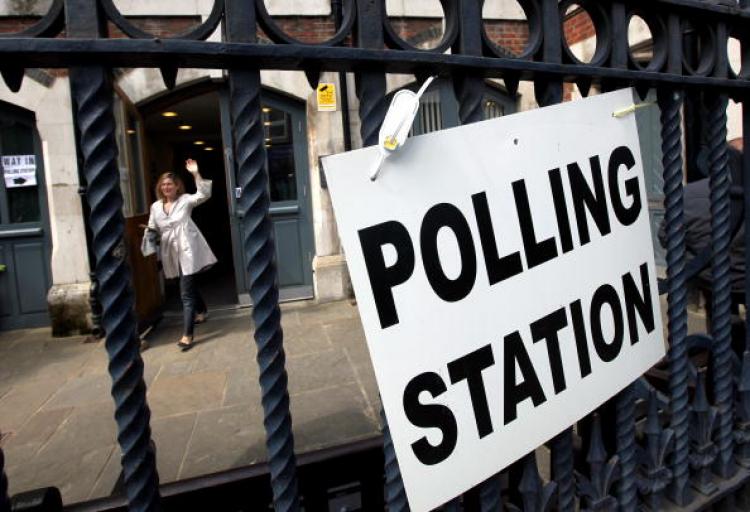LONDON—An exit poll predicts the British election will result in a hung parliament, or no single party having a majority, with the Conservative Party holding the largest number of seats but falling just short of an overall majority.
The joint poll by BBC / SKY / ITN of people coming out 130 polling stations calculated that the Conservatives would have 307 seats, the Labour Party 255 seats and the Liberal Democrats (Lib Dems) just 59 seats.
This last statistic is the most surprising as it would mean the Liberal Democrats drop seats – completely in contradiction to the apparent swelling of support for the Party following the over-night success of their leader Nick Clegg in the TV-election debates.
The actual results of the UK election are expected to be known by Friday morning. With such a closely-contested election, the overall outcome may not be clear until the results from every last constituency have been counted.
But even when the election results are known, it may take several days to figure out who is forming the government. If the UK election results in a hung parliament, then the country enters into grey constitutional territory only breached on two previous occasions.
At the last general election, the same exit poll accurately predicted the winning Party’s number of seats and slightly miscalculated those of the other two Parties. However, this is regarded by many as being due more to luck than to statistical accuracy.
Even in the US, in predictions of a straight two-way vote, exit polls have on occasions in the past been wildly inaccurate. In the Gore-Bush election, exit polls in five states were off by between 7 and 16 points.
In the UK, with its first-past-the-post system and the election essentially revolving around 100 marginal seats, extrapolating from the general trends to the specific seats is even more potentially hazardous. General trends have to be translated into specific predictions for each seat – on the basis of past voting trends.
This election has proved even more difficult for pollsters because of more unstable factors than in previous years.
One factor is the enormous public anger over the MPs’ expenses scandals, which may cause voters in certain areas to vote out of line with national trends in order to punish candidates who they regard as having their ‘snouts in the trough’.
The addition of more independent parties campaigning on specific issues has also made general trends harder to extrapolate.
The British election results were thrown further into uncharted waters 3 weeks ago by the country’s first ever televised leaders’ debates.
Previously denied an equal platform to speak to the electorate, Nick Clegg’s well-polished performance pulled his Lib Dem party out of the shadow to transform the 2-horse race of British politics into a real 3-horse race.
The ensuing ‘Cleggmania’ quickly became the talking-point of the British election, displaced from the media spotlight only by ‘Bigot-gate’, when Gordon Brown was caught calling a long-time Labour Party supporter a ‘bigot’, after she questioned him on immigration.
The joint poll by BBC / SKY / ITN of people coming out 130 polling stations calculated that the Conservatives would have 307 seats, the Labour Party 255 seats and the Liberal Democrats (Lib Dems) just 59 seats.
This last statistic is the most surprising as it would mean the Liberal Democrats drop seats – completely in contradiction to the apparent swelling of support for the Party following the over-night success of their leader Nick Clegg in the TV-election debates.
The actual results of the UK election are expected to be known by Friday morning. With such a closely-contested election, the overall outcome may not be clear until the results from every last constituency have been counted.
But even when the election results are known, it may take several days to figure out who is forming the government. If the UK election results in a hung parliament, then the country enters into grey constitutional territory only breached on two previous occasions.
At the last general election, the same exit poll accurately predicted the winning Party’s number of seats and slightly miscalculated those of the other two Parties. However, this is regarded by many as being due more to luck than to statistical accuracy.
Even in the US, in predictions of a straight two-way vote, exit polls have on occasions in the past been wildly inaccurate. In the Gore-Bush election, exit polls in five states were off by between 7 and 16 points.
In the UK, with its first-past-the-post system and the election essentially revolving around 100 marginal seats, extrapolating from the general trends to the specific seats is even more potentially hazardous. General trends have to be translated into specific predictions for each seat – on the basis of past voting trends.
This election has proved even more difficult for pollsters because of more unstable factors than in previous years.
One factor is the enormous public anger over the MPs’ expenses scandals, which may cause voters in certain areas to vote out of line with national trends in order to punish candidates who they regard as having their ‘snouts in the trough’.
The addition of more independent parties campaigning on specific issues has also made general trends harder to extrapolate.
The British election results were thrown further into uncharted waters 3 weeks ago by the country’s first ever televised leaders’ debates.
Previously denied an equal platform to speak to the electorate, Nick Clegg’s well-polished performance pulled his Lib Dem party out of the shadow to transform the 2-horse race of British politics into a real 3-horse race.
The ensuing ‘Cleggmania’ quickly became the talking-point of the British election, displaced from the media spotlight only by ‘Bigot-gate’, when Gordon Brown was caught calling a long-time Labour Party supporter a ‘bigot’, after she questioned him on immigration.







